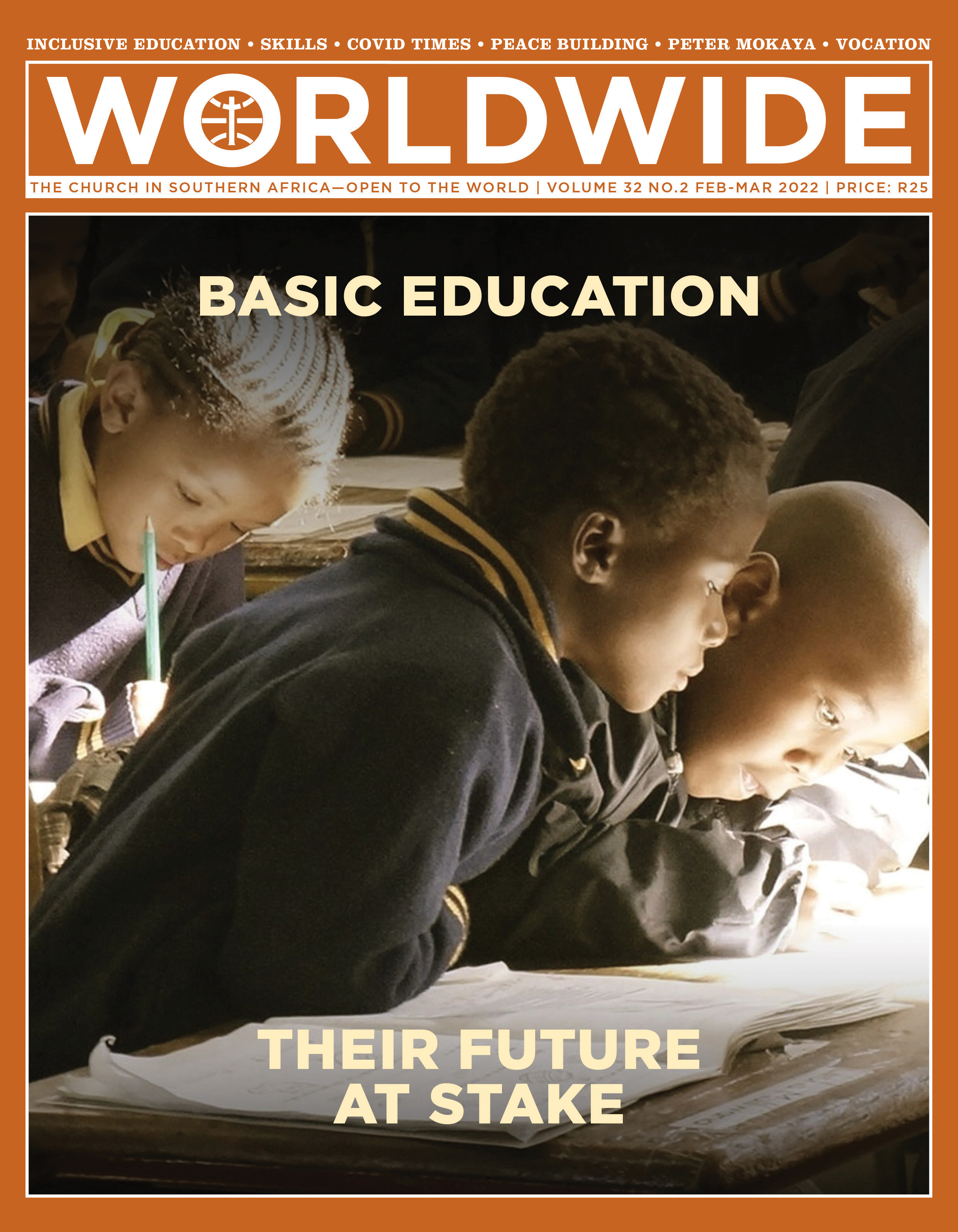
Basic Education Their Future At Stake
The front cover picture was certainly not taken during Covid times. We do not know its exact location, but it could be from any particular school in rural South Africa. What indeed the image of these children reflects is their eagerness for learning and doing it together. Their minds are surely full of dreams; their desires for a bright future cannot be frustrated. The task of offering them an inclusive and integral quality education can look gigantic, but each one’s contribution can make the miracle happen.
FOCUS • SCHOOL SUPPORT
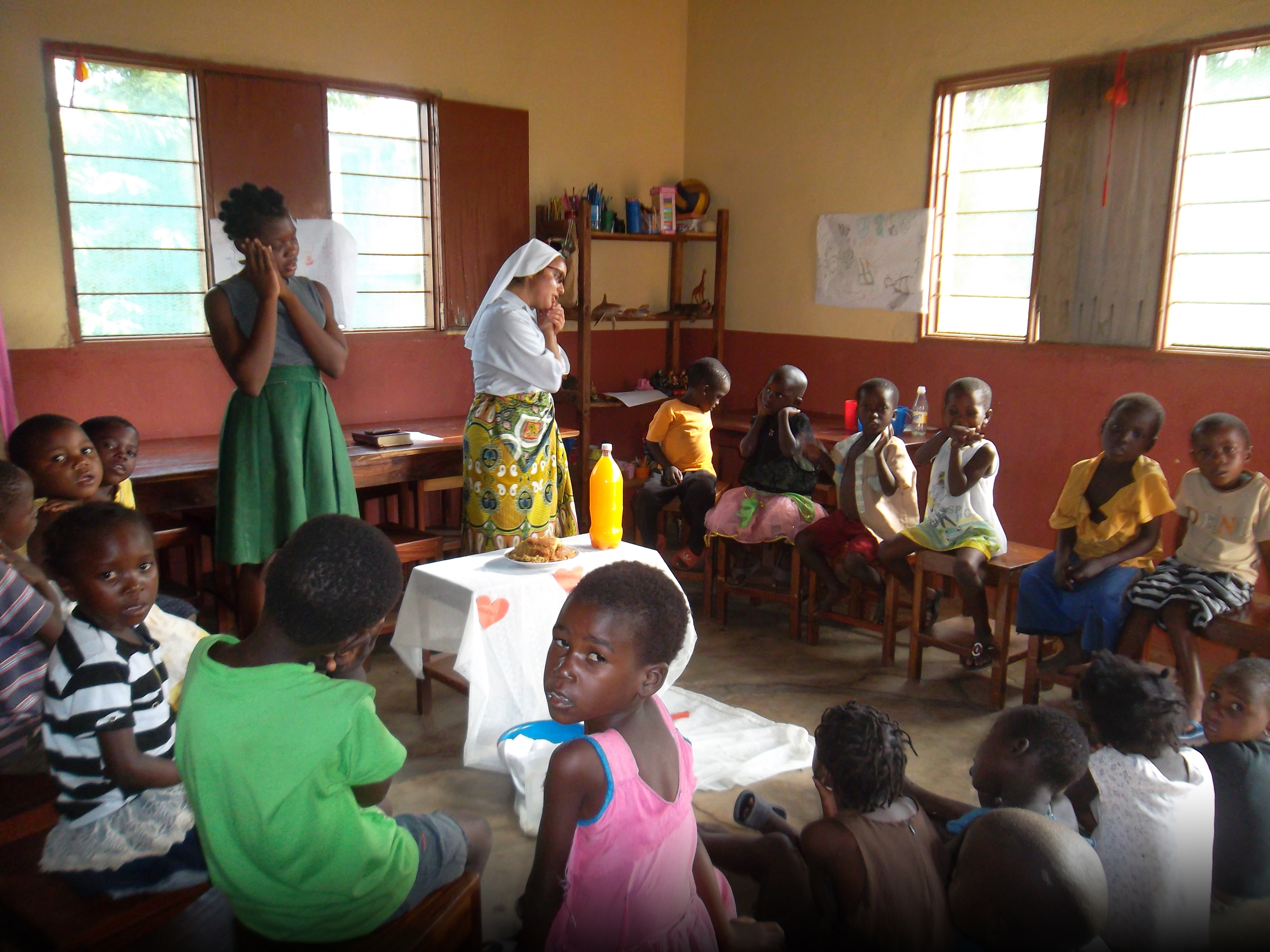
Credit: Sr Carmen Revelo.
A Grain of Sand for a Better World
The Franciscan Sisters of the Holy Family arrived at Charre Mission in 2006. Currently the community consists of three sisters from Colombia. One of them shares their experience in the field of education
BY Sr Carmen Revelo | Charre, Mozambique
I HAVE lived, during the last three years—together with Srs Sandra Morales and Senid Bermudez—in the mission of Charre, a small community in the district of Mutarara, in Tete Province.
I feel always grateful when I see so many children, adolescents and young people of school age in our surroundings. However, the sad part of it is that most of them do not have the possibility of enjoying the gift of learning and sharing knowledge with other students in the different schools of the area. In the zone where we live there is a widespread lack of awareness of the importance of education in the various stages of every human being’s life, of the significance of the formative process in every person. That is why there are very few children integrated into the educational system, who regularly go to school and do not abandon it.
Low educational level
One of the great challenges is that the majority of the population is illiterate; the level of the few who go to school is also quite low and that becomes a hindrance in the continuation of their studies or in the advancement to higher levels of education. There are various factors that contribute to it. Among others we can cite the following:
First of all, the lack of school structures that guarantee quality learning and conducive environments for teaching. In small rural schools, most of the children do not have classrooms or the minimum conditions that guarantee them to remain in the school and to obtain a good academic performance. Lessons are given outdoors. There is also a high rate of poverty among the population, who live in subhuman conditions, including child malnutrition. Many students go to school without eating, a condition that sometimes lasts for several days.
Moreover, the quality of education continues to be an area of great concern. Due to a lack of continuity in the educational process, quality education cannot be implemented, not allowing an effective mastery of contents provided in the curricular plans, which don’t seem to address the needs of the population.
The initial children’s learning is done in their mother tongue, Chesena, until grade three. The following year they continue in Portuguese without having the minimum basics of this national official language. This causes a high dropout; children do not manage to overcome this challenge and prefer to stay at home. Those who continue in the school are automatically promoted, even though they have not learnt to read and write, neither in Chesena nor in Portuguese. Few of them reach grade twelve, but have a knowledge at primary school level.
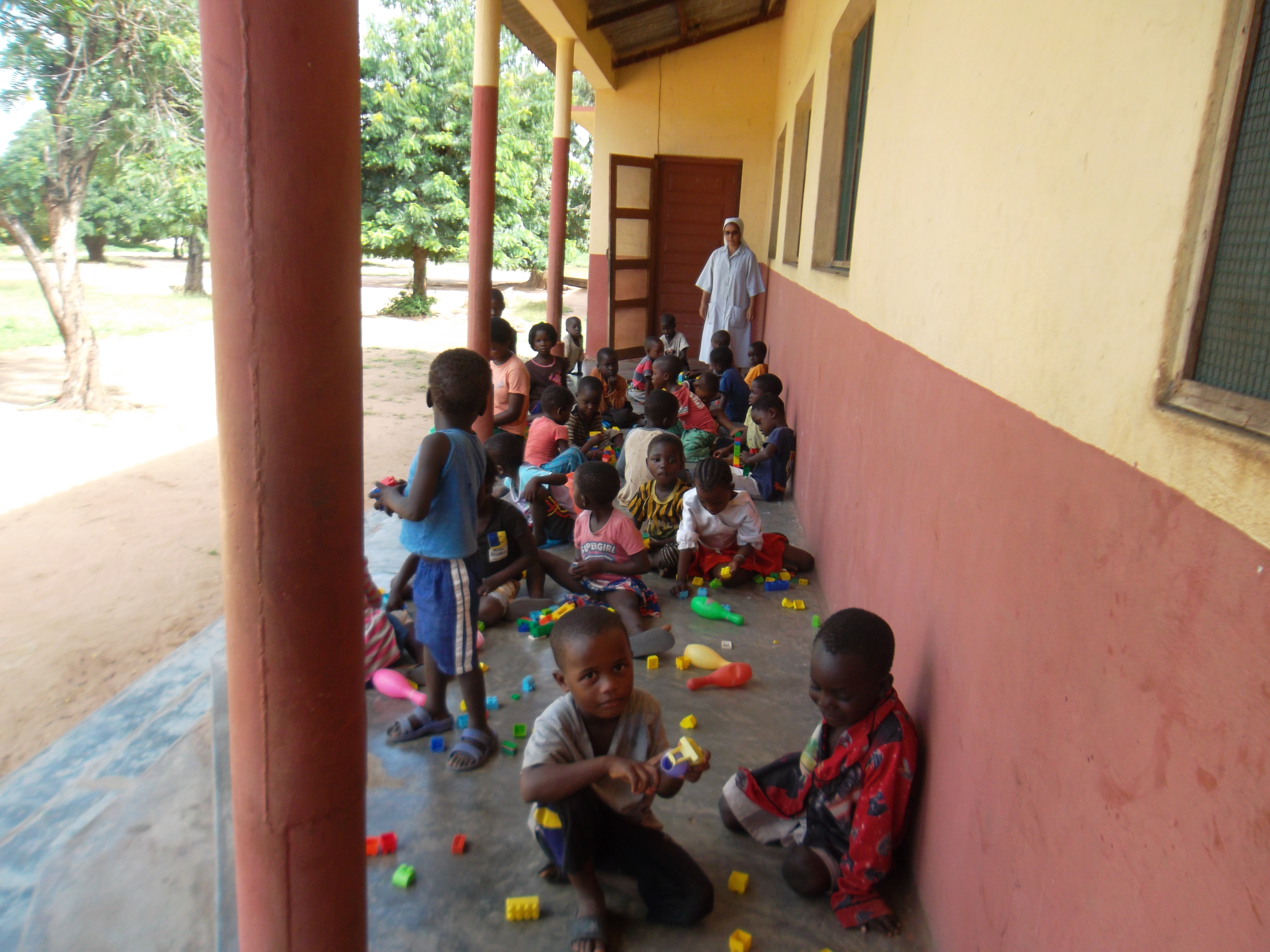
Credit: Sr Carmen Revelo.
Lack of commitment
Another challenge is the lack of teachers assigned to the area, and their constant absenteeism. They do not take teaching as a vocation, but as a job done only for the sake of the payment received. Children go to school and, not finding their teachers, they spend their time playing and staying on the roads, sometimes engaged in aggressive games or inappropriate activities.
There is also a lack of commitment of most parents in the education of their children. There is no teamwork among the parents—most of them are illiterate—and little family support in the learning and teaching process of their children. These are some of the existing challenges. The commitment of all is necessary in order to achieve a better, quality education. We need to believe that it is possible to accomplish it and to seek new alternatives and different processes to obtain it.
The commitment of all is necessary in order to achieve a better, quality education
A grain of sand
Facing this educational reality, and present in this mission area for several years, the Franciscan Sisters of the Holy Family started a project of school support or escolinha, (in Portuguese language), that provides academic assistance to those who are willing to remain in the formal school. This project includes a commitment on the side of the parents and the support of the school teachers.
The school support began in 2009. When the children start, in the first year, they usually do not understand the Portuguese language, only Chesena, so we teach them with playful activities, games, crafts, stories focused on strengthening human values; we also give them small tips on personal care.
It must be mentioned that this is not a school, but a school support. The children study in the school of Nhanpane, located in the mission of Charre, during morning hours, and the assistance is done in the afternoon.
In the last three years, continuity has been given to a group of 25 children enrolled in this programme. We have seen their progress; they understand when Portuguese is spoken. We use phrases, stories, objects, actions, games, songs. We ask them to write small phrases or words, such as names of animals, school supplies and to interact among themselves with short dialogues.
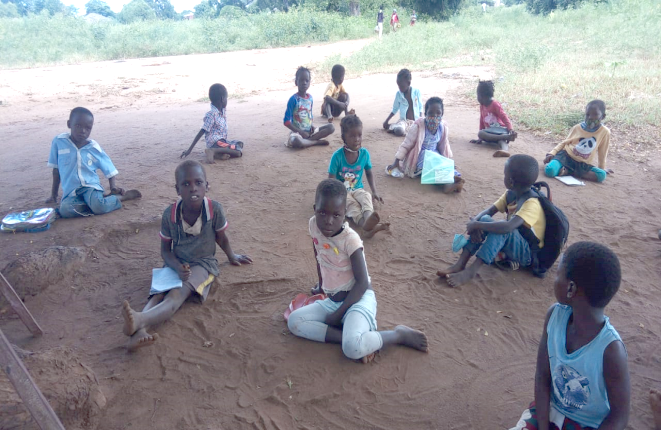
Those who remain in this project are those who really show interest in studying. Sometimes during the last two years, classes were suspended due to COVID-19, but in general we were able to give continuity to our escolinha. The learning is bilingual, with the help of a person who does the translation; it is a slow process, because of the language. Children need to get habituated to study schedules, gradually becoming aware of the desire and passion for learning, how to read, write and speak.
This process has been facilitated and achieved through different pedagogical strategies, such as games, contests, dramas, painting, reading, educational outings, so that learning becomes meaningful to the children, taking into account the needs of each student.
We have also implemented few changes in our escolinha. Its physical space has been adapted, educational and playful materials have been acquired, to strengthen the learning process of the children.
Parents’ involvement
The involvement of the parents in this educational process consists basically in the following commitments:
Enrolment of their children to study in the official school and not only in the school support programme.
Supporting their children to attend school regularly and punctually, not taking them to work or sending them to other families. Care for the children’s health by taking them to the hospital when needed, so that they can recover quickly and not miss classes. Participate in training meetings for parents and guardians. As much as possible, to help the children at home to carry out complementary activities. To take care of the feeding, hygiene and personal appearance of their children
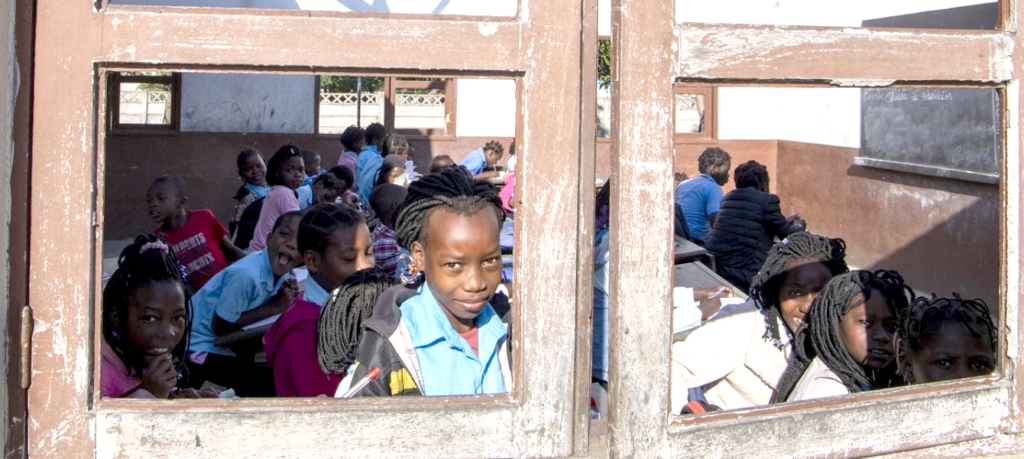
Evaluation
Our objective with the support programme is to strengthen the learning process of the children, using pedagogical strategies, so that they learn to read, write and speak in Portuguese. Our goal is to continue the process, started in 2019, with the same group of students, from grade one to grade five, to help them to overcome difficulties in their reading comprehension, written production and verbal expression, so that they can proceed, without difficulties, to secondary school. If we look at the results obtained so far, we have identified that those who are in the programme, have a lower dropout rate in the official school. Out of the group of 25, only one has dropped out each year, and who do not have the support of their families. Instead, most of the group continues.
Among the group of the parents of these 25 students, 15 of them have shown interest and commitment to their children, participating in the meetings, being responsible in sending their children to school and assisting them, caring for them when they are sick, which is very frequent, due to malaria.
These attempts represent our efforts towards the wellbeing of these children— a grain of sand in the construction of a happier world
Today, we are grateful for this group of happy children and parents who try to give the best of themselves; everything has been a continuous, slow and humanizing process. These attempts represent our efforts aimed towards the wellbeing of these children—a grain of sand in the construction of a happier world.
| Dates To Remember |
|
February 1 – Blessed Benedict Daswa 2 – World Day of Prayer for Consecrated Life 4 – International Day of Human Fraternity 6 – International Day of Zero Tolerance of Female Genital Mutilation 8 – International Day of Prayer and Awareness against Human Trafficking 11 – International Day of Women and Girls in Science 11 – World Day of the Sick 13 – World Radio Day 20 – World Day of Social Justice 21 – International Mother Language Day March 1 – Zero Discrimination Day 2 – Ash Wednesday 3 – World Wildlife Day 8 – International Women’s Day 15 – St Daniel Comboni’s Birthday 20 – International Day of Happiness 21 – International Day for the Elimination of Racial Discrimination 21 – SA Human Rights Day 22 – World Water Day 24 – World Tuberculosis Day 24 – International Day for the Right to the Truth concerning Gross Human Rights Violations and for the Dignity of Victims 25 – International Day of Remembrance of the Victims of Slavery and the Transatlantic Slave Trade |

Thanks for your blog, nice to read. Do not stop.